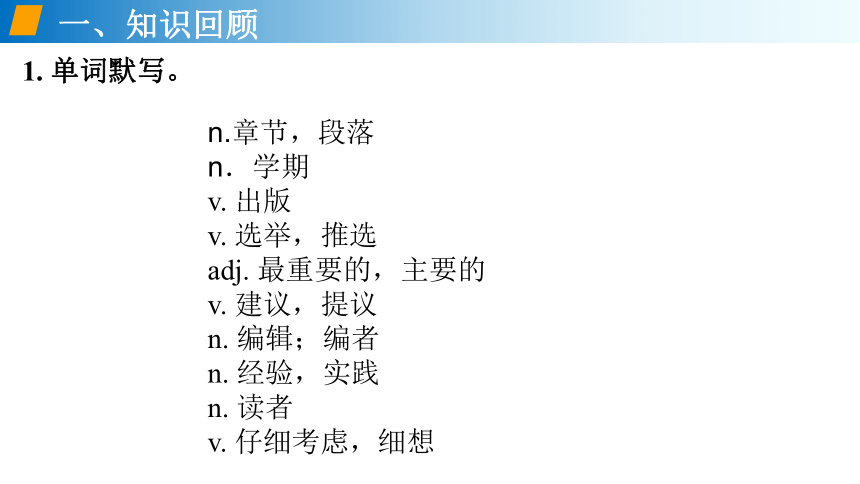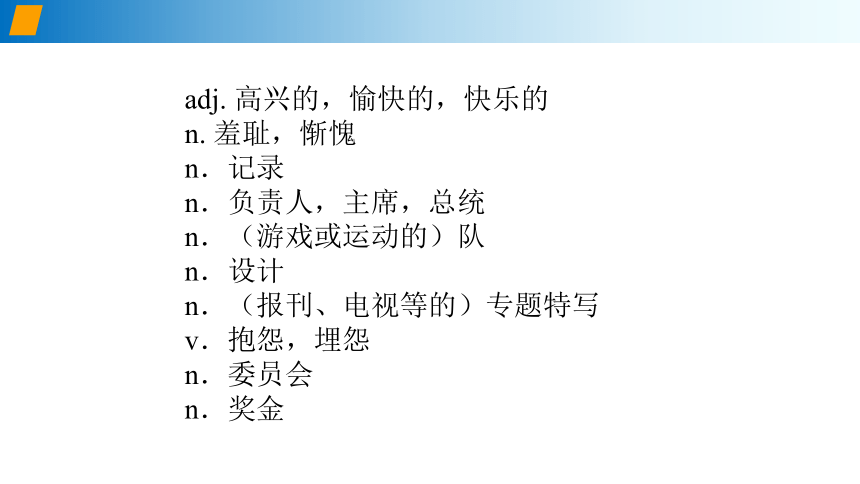Unit4 Newspaper 第2课时 语法知识及拓展 课件(共20张PPT)
文档属性
| 名称 | Unit4 Newspaper 第2课时 语法知识及拓展 课件(共20张PPT) |

|
|
| 格式 | pptx | ||
| 文件大小 | 507.6KB | ||
| 资源类型 | 试卷 | ||
| 版本资源 | 牛津上海版(试用本) | ||
| 科目 | 英语 | ||
| 更新时间 | 2022-03-09 22:08:18 | ||
图片预览









文档简介
(共20张PPT)
Lead in— 脑筋急转弯
Q:什么东西使人哭笑不得?
A:口罩
沪教版 英语 八年级 第二学期
Snow and Ice Knowledge 冰雪知识
Speed Skating
沪教版 英语 八年级 第二学期
一、知识回顾
1. 单词默写。
n.章节,段落
n.学期
v. 出版
v. 选举,推选
adj. 最重要的,主要的
v. 建议,提议
n. 编辑;编者
n. 经验,实践
n. 读者
v. 仔细考虑,细想
adv. 短暂的
conj. 是否
n. 决心;决定
n. 班长
n. 入选者,被选中的东西
n. 青年时期
n. 天才,天赋
v. 聚集,召集
n. 祝贺,恭喜
v. 值得,应得
adj. 高兴的,愉快的,快乐的
n. 羞耻,惭愧
n.记录
n.负责人,主席,总统
n.(游戏或运动的)队
n.设计
n.(报刊、电视等的)专题特写
v.抱怨,埋怨
n.委员会
n.奖金
二、Important Sentences structures
1. I started taking notes.
start doing sth.开始做某事
e.g. We should start doing our homework when we get home.
我们一到家就应该开始做家庭作业。
2. …or should they pay for it
pay…for sth. 为……付款
它与spend…on及cost意思相近。
e.g. I paid 20 yuan for the book.=I spent 20 yuan on the book.=The book cost me 20 yuan.
我花20元钱买的这本书。
3. What should we call it
e.g. Pansy said we ought to call it the Mayfield Sun.
情态动词(should/should not, ought to/ought not to)
should和ought to多用于劝告或建议,语气委婉。
e.g. You ought to/should obey your parents. 你应该听你父母的话。
You ought not to/shouldn't smoke so much, you are wasting your money. 你不应该吸这么多烟,你是在浪费钱。
I told him that he ought to/should do it. 我告诉他他应该做这件事。
Ⅰ. Read and choose the best answer.
( )1. The woman decided the good servant.
A. to believe not B. don't believe
C. to believe D. to not believe
( )2. The town was about train ride away from his home.
A. four hour's B. four hours' C. four hour D. four hours
( )3. The teacher told us to the problem among ourselves.
A. talk over B. talk with C. talk to D. talk off
( )4. We can learn from the newspapers and magazines.
A. many B. much C. a lot of D. lot of
( ) 5. —Ought we to write a report about our meeting for the headmaster
—No, you .
A. ought to B. ought not to C. ought to not D. not ought to
【keys】
Ⅰ.1.C 2.B 3.A 4.B 5.B
【随堂小练】
三、语法新课讲解
情态动词should、ought to
一、should的用法:
should用做情态动词,无时态和人称变化,后面跟动词原形。其否定式为:should not(shouldn't)
1. 表示“义务或责任”,意思是“应该”。
e.g. We should keep our promise. 我们应该遵守诺言。
You shouldn't be so careless. 你不应如此粗心大意。
【友情提示】should后面跟“have+过去分词”结构,其肯定句表示过去应该做而未做的事,其否定句则表示过去不该做但做了的事情。
e.g. You should have started 5 minutes earlier.
你应该早5分钟动身。(却没早动身)
I should have thought of that. 这一点我是应当想到的。
(却没想到)
She looks very ill. She should have stayed at home.
她看样子病很严重,她本应待在家里。(却没待在家里)
You should not have gone back to work without the doctor's permission.
你不应该未经医生许可就回去工作。(却去工作了)
2. 表示可能性、推测、估计,意思是“可能”、“该”。
e.g. She should be home by now, I think.
我想,她现在可能(该)到家了。
It's two o’clock, the football game should begin soon.
已经两点钟了,足球比赛不久就该开始了。
3. 表示说话人用委婉、谦虚的语气提出意见、请求或建议,意思是“可”、“倒是”、“想”等。
e.g. I should say it would be better to try it again
我以为可再试试。(提出建议)
I should advise you to pay more attention to your health.
我倒是想劝你多注意身体。(建议)
I should like to have a talk with you.
我想跟你谈一谈。(请求)
二、ought to的用法:
ought无时态和人称变化,后面跟(带to的)动词不定式,其疑问式为:Ought I/you to…?其否定式为:
ought not to…
1. 表示有义务必须做某事,意思是“应该”;其语气比should强,带有责备或督促的含义。
e.g. You ought to be punctual. 你应该守时。
--Ought he to do it at once 他应当立刻就做吗?
--Yes, he ought(to). 是的,他应当立刻就做。
They ought to go tomorrow. 他们应该明天去。
You ought not /oughtn't to drink too much. 你不应该喝太多酒。
She said such a thing ought not to be allowed to happen.
她说这样的事不应当允许发生。
【友情提示】ought to后面跟“have+过去分词”结构,表示对过去该做而未做之事的责难、后悔或遗憾的心情。
e.g. You ought to have helped her.
你本该帮助她的。(却没有帮助她)
He ought to have returned these books to the library last week.
他上星期就应该把这些书还给图书馆。(却没有还书)
I ought not to have done it. 我本不该做这件事。(却做了)
2. 表示非常可能的事,意思是“一定会”、“该……”。
e. g. We ought to win. 我们一定会赢。
If he started at ten, he ought to be there by time.
假如他10点出发,现在该到那里了。
【例1】
--I don't care what my teachers think.
--Well, you___________.
A. could B. would C. should D. might
【答案】 C
【解析】 句意为:——我不在乎老师怎么想。——哦,你应该在乎的。根据上下文提示及句意可知答案为C。
【随堂小练】
【例2】
--How was the youth club last night, Mark
--It was great fun. You___________come.
A. must B. can C. should D. may
【答案】 C
【解析】 must表示“必须”,can表示“能够”,should表示“应该”,may表示“可能”,由题意可知答案为C。
愿君皆有所获,皆有所得
Lead in— 脑筋急转弯
Q:什么东西使人哭笑不得?
A:口罩
沪教版 英语 八年级 第二学期
Snow and Ice Knowledge 冰雪知识
Speed Skating
沪教版 英语 八年级 第二学期
一、知识回顾
1. 单词默写。
n.章节,段落
n.学期
v. 出版
v. 选举,推选
adj. 最重要的,主要的
v. 建议,提议
n. 编辑;编者
n. 经验,实践
n. 读者
v. 仔细考虑,细想
adv. 短暂的
conj. 是否
n. 决心;决定
n. 班长
n. 入选者,被选中的东西
n. 青年时期
n. 天才,天赋
v. 聚集,召集
n. 祝贺,恭喜
v. 值得,应得
adj. 高兴的,愉快的,快乐的
n. 羞耻,惭愧
n.记录
n.负责人,主席,总统
n.(游戏或运动的)队
n.设计
n.(报刊、电视等的)专题特写
v.抱怨,埋怨
n.委员会
n.奖金
二、Important Sentences structures
1. I started taking notes.
start doing sth.开始做某事
e.g. We should start doing our homework when we get home.
我们一到家就应该开始做家庭作业。
2. …or should they pay for it
pay…for sth. 为……付款
它与spend…on及cost意思相近。
e.g. I paid 20 yuan for the book.=I spent 20 yuan on the book.=The book cost me 20 yuan.
我花20元钱买的这本书。
3. What should we call it
e.g. Pansy said we ought to call it the Mayfield Sun.
情态动词(should/should not, ought to/ought not to)
should和ought to多用于劝告或建议,语气委婉。
e.g. You ought to/should obey your parents. 你应该听你父母的话。
You ought not to/shouldn't smoke so much, you are wasting your money. 你不应该吸这么多烟,你是在浪费钱。
I told him that he ought to/should do it. 我告诉他他应该做这件事。
Ⅰ. Read and choose the best answer.
( )1. The woman decided the good servant.
A. to believe not B. don't believe
C. to believe D. to not believe
( )2. The town was about train ride away from his home.
A. four hour's B. four hours' C. four hour D. four hours
( )3. The teacher told us to the problem among ourselves.
A. talk over B. talk with C. talk to D. talk off
( )4. We can learn from the newspapers and magazines.
A. many B. much C. a lot of D. lot of
( ) 5. —Ought we to write a report about our meeting for the headmaster
—No, you .
A. ought to B. ought not to C. ought to not D. not ought to
【keys】
Ⅰ.1.C 2.B 3.A 4.B 5.B
【随堂小练】
三、语法新课讲解
情态动词should、ought to
一、should的用法:
should用做情态动词,无时态和人称变化,后面跟动词原形。其否定式为:should not(shouldn't)
1. 表示“义务或责任”,意思是“应该”。
e.g. We should keep our promise. 我们应该遵守诺言。
You shouldn't be so careless. 你不应如此粗心大意。
【友情提示】should后面跟“have+过去分词”结构,其肯定句表示过去应该做而未做的事,其否定句则表示过去不该做但做了的事情。
e.g. You should have started 5 minutes earlier.
你应该早5分钟动身。(却没早动身)
I should have thought of that. 这一点我是应当想到的。
(却没想到)
She looks very ill. She should have stayed at home.
她看样子病很严重,她本应待在家里。(却没待在家里)
You should not have gone back to work without the doctor's permission.
你不应该未经医生许可就回去工作。(却去工作了)
2. 表示可能性、推测、估计,意思是“可能”、“该”。
e.g. She should be home by now, I think.
我想,她现在可能(该)到家了。
It's two o’clock, the football game should begin soon.
已经两点钟了,足球比赛不久就该开始了。
3. 表示说话人用委婉、谦虚的语气提出意见、请求或建议,意思是“可”、“倒是”、“想”等。
e.g. I should say it would be better to try it again
我以为可再试试。(提出建议)
I should advise you to pay more attention to your health.
我倒是想劝你多注意身体。(建议)
I should like to have a talk with you.
我想跟你谈一谈。(请求)
二、ought to的用法:
ought无时态和人称变化,后面跟(带to的)动词不定式,其疑问式为:Ought I/you to…?其否定式为:
ought not to…
1. 表示有义务必须做某事,意思是“应该”;其语气比should强,带有责备或督促的含义。
e.g. You ought to be punctual. 你应该守时。
--Ought he to do it at once 他应当立刻就做吗?
--Yes, he ought(to). 是的,他应当立刻就做。
They ought to go tomorrow. 他们应该明天去。
You ought not /oughtn't to drink too much. 你不应该喝太多酒。
She said such a thing ought not to be allowed to happen.
她说这样的事不应当允许发生。
【友情提示】ought to后面跟“have+过去分词”结构,表示对过去该做而未做之事的责难、后悔或遗憾的心情。
e.g. You ought to have helped her.
你本该帮助她的。(却没有帮助她)
He ought to have returned these books to the library last week.
他上星期就应该把这些书还给图书馆。(却没有还书)
I ought not to have done it. 我本不该做这件事。(却做了)
2. 表示非常可能的事,意思是“一定会”、“该……”。
e. g. We ought to win. 我们一定会赢。
If he started at ten, he ought to be there by time.
假如他10点出发,现在该到那里了。
【例1】
--I don't care what my teachers think.
--Well, you___________.
A. could B. would C. should D. might
【答案】 C
【解析】 句意为:——我不在乎老师怎么想。——哦,你应该在乎的。根据上下文提示及句意可知答案为C。
【随堂小练】
【例2】
--How was the youth club last night, Mark
--It was great fun. You___________come.
A. must B. can C. should D. may
【答案】 C
【解析】 must表示“必须”,can表示“能够”,should表示“应该”,may表示“可能”,由题意可知答案为C。
愿君皆有所获,皆有所得
